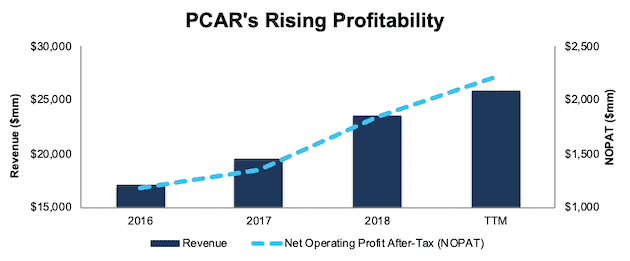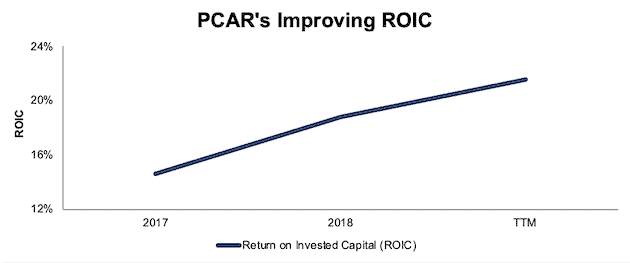Featured Stock In January’s Exec Comp & ROIC Model Portfolio
Recap from December’s Picks
Our Exec Comp Aligned with ROIC Model Portfolio (-0.4%) underperformed the S&P 500 (+3.3%) from December 13, 2019, through January 13, 2020. The best performing stock in the portfolio was up 8.7%. Overall, five out of the 15 Exec Comp Aligned with ROIC Stocks outperformed the S&P from December 13, 2019, through January 13, 2020.
Only our research utilizes the superior data and earnings adjustments featured by the HBS & MIT Sloan paper, "Core Earnings: New Data and Evidence.” The success of this Model Portfolio highlights the value of our Robo-Analyst technology[1], which scales our forensic accounting expertise (featured in Barron’s) across thousands of stocks.
This Model Portfolio only includes stocks that earn an Attractive or Very Attractive rating and align executive compensation with improving ROIC. We think this combination provides a uniquely well-screened list of long ideas because return on invested capital (ROIC) is the primary driver of shareholder value creation.[2]
New Stock Feature for January: PACCAR Inc. (PCAR: $77/share)
PACCAR Inc. (PCAR) is the featured stock in January’s Exec Comp Aligned with ROIC Model Portfolio.
We recently highlighted PCAR as one of our Most Attractive stocks on May 9, 2019. Since then, the stock is up 11% (vs. S&P 500 up 15%) and looks even more undervalued.
Since 2016, PCAR has grown revenue by 17% compounded annually and after-tax operating profit (NOPAT) by 25% compounded annually. Trailing twelve-month (TTM) NOPAT is up 23% over the prior TTM period. Profit growth has been fueled by rising NOPAT margins, which are up from 1% in 2009 to 9% TTM.
Figure 1: PCAR Revenue & NOPAT Growth Since 2016
(Click on image to enlarge)

Sources: New Constructs, LLC and company filings
Executive Compensation Plan Helps Drive Shareholder Value Creation
PCAR has included return on capital as a performance metric in its executive compensation plan for over 20 years. Last year, a three-year change in return on capital was one of three equally weighted metrics used to determine executives’ long-term cash awards.
PCAR has improved its ROIC from 15% in 2017 to 22% TTM. PCAR’s executive compensation plan lowers the risk of investing in the company’s stock because we know executives’ interests are tied to shareholders’ interests.
Figure 2: PCAR’s ROIC Since 2017
(Click on image to enlarge)

Sources: New Constructs, LLC and company filings
PCAR is Undervalued
At its current price of $77/share, PCAR has a price-to-economic book value (PEBV) ratio of 0.8. This ratio means the market expects PCAR’s NOPAT to permanently decline by 20%. This expectation seems pessimistic given that PCAR has grown NOPAT by 7% compounded annually over the past decade.
If PCAR can maintain 2018 NOPAT margins of 8% (below TTM margin of 9%) and grow NOPAT by just 4% compounded annually for the next decade, the stock is worth $96/share today – a 25% upside. See the math behind this reverse DCF scenario.
Critical Details Found in Financial Filings by Our Robo-Analyst Technology
As investors focus more on fundamental research, research automation technology is needed to analyze all the critical financial details in financial filings as shown in the Harvard Business School and MIT Sloan paper, "Core Earnings: New Data and Evidence”.
Below are specifics on the adjustments we make based on Robo-Analyst findings in PCAR’s 2018 10-K:
Income Statement: we made $374 million of adjustments, with a net effect of removing $354 million in non-operating income (1% of revenue). You can see all the adjustments made to PCAR’s income statement here.
Balance Sheet: we made $ 5.9 billion of adjustments to calculate invested capital with a net decrease of $1.9 billion. One of the most notable adjustments was $301 million in total reserves. This adjustment represented 3% of reported net assets. You can see all the adjustments made to PCAR’s balance sheet here.
Valuation: we made $4.0 billion of adjustments with a net effect of increasing shareholder value by $2.8 billion. One of the largest adjustments to shareholder value was $3.4 billion in excess cash. This adjustment represents 13% of PCAR’s market cap. See all adjustments to PCAR’s valuation here.
[1] Harvard Business School features the powerful impact of our research automation technology in the case New Constructs: Disrupting Fundamental Analysis with Robo-Analysts.
[2] This paper compares our analytics on a mega-cap company to other major providers. The Appendix details exactly how we stack up.



